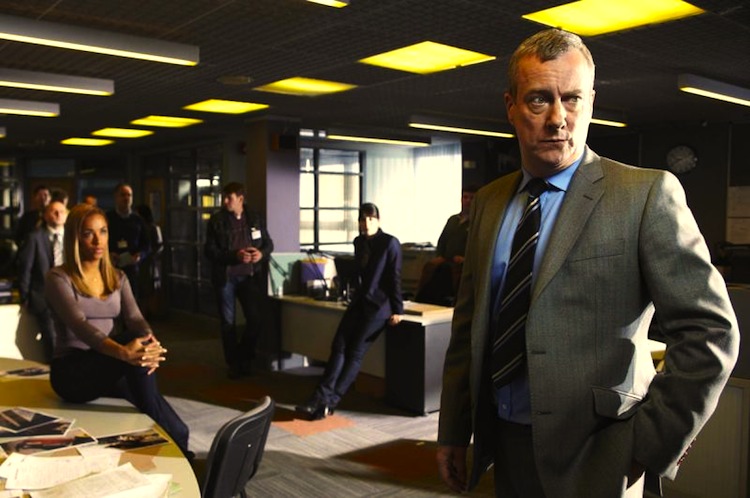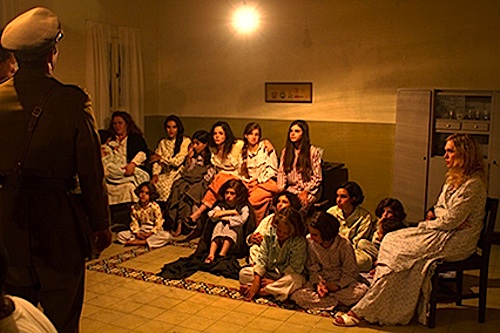By Joe Bendel. East Yorkshire DCI Alan Banks is an avid jazz listener. From this we can deduce he is a man of principle, used to doing things the hard way. His Detective Sergeant respects and is frustrated by that (the principles, not the music). He might be tightly wound, but in the words of a superior officer, he “is the least worst man for the job.” Based on Peter Robinson’s novels, BBC Worldwide’s DCI Banks enters into syndication on PBS stations across the country this month, reaching an impressive 77% market clearance.
DCI Banks starts with an apparent ending. In The Aftermath, two patrol officers responding to a domestic disturbance discover a serial killer’s chamber of horrors. One of the officers is killed in the ensuing struggle and the murderer is comatose. For acting DCI Banks this is no happy ending. After fruitless months of investigation, one young woman is still missing. The big question is what role did his battered wife play in her husband’s crimes? Already stretched to the breaking point, he is in no mood for the internal investigation headed by the ambitious DS Annie Cabbot.
After an involuntary vacation and an unexpected promotion to full DCI, Banks returns for a standard but well executed game of cat-and-mouse in Playing with Fire. Despite their rocky start, Banks and the freshly transferred Cabbot have developed a strong working relationship. Yet her questionable romantic involvement with a figure involved in the case threatens to undo everything.
Technically the second episode of the first full season, Friend of the Devil is easily the best of Banks’ first two full seasons. Returning to a notorious scene from the pilot Aftermath, Friend of the Devil delves into some dark, painful psychological recesses. It is a case that hits close to home for the force and keeps on hitting. In fact, there will be considerable turnover in the Yorkshire CID over the course of the series.
Likewise, Cold is the Grave entangles Banks in a messy intersection of police and family business when his high-handed superintendant asks Banks to unofficially find his runaway daughter and bring her home. It turns out that the London vice lord she had shacked up with may somehow be involved in an armed robbery-turned cold blooded murder back home. Although it would seem like it would take a lot of elbow grease to force these strands together, Robert Murphy’s adaptation of Robinson’s novel does so rather neatly and orderly.
The shoe is on Banks’ foot in Strange Affair when his estranged brother is ensnared in a murder case. With a suddenly pregnant Cabbot on the verge of a leave of absence, Banks meets his new DI, Helen Morton, under slightly embarrassing circumstances. He is the prime witness in her first case. Socially awkward, even compared to Banks, their professional chemistry will develop slowly. However, they synch-up quite nicely in Dry Bones that Dream and Innocent Dreams, two traditional procedurals that both have nicely turned third act twists, at least by television standards.
For British mystery fans, DCI Banks might be closest in tone to the Inspector Lynley Mysteries – but its best episodes, like Aftermath and Friend of the Devil, approach Wire in the Blood’s murky psychological terrain. TV veteran Stephen Tompkinson’s Banks is somewhat like Inspector Lewis, but with more edge. (Evidently Yorkshire crimes are more brutal than those in Oxford.) Airing as either 45 minute two-parters or in ninety minute blocks, the entire series is consistently tight and tense. Notable directors include James Hawes (Aftermath), who helmed Masterpiece’s entertaining 39 Steps and Marek Losey (Cold is the Grave), grandson of Joseph.
Driven by Topkinson’s intense middle-aged rectitude, DCI Banks episodes are produced with above average intelligence and are addictive like popcorn. A worthy addition to the ranks of favorite PBS-BBC detectives, DCI Banks is easily recommended for mystery fans as it begins its syndicated run on many PBS outlets (including WLIW), so check those local listings.
LFM GRADE: A-
Posted on January 14th, 2012 at 12:38pm.

